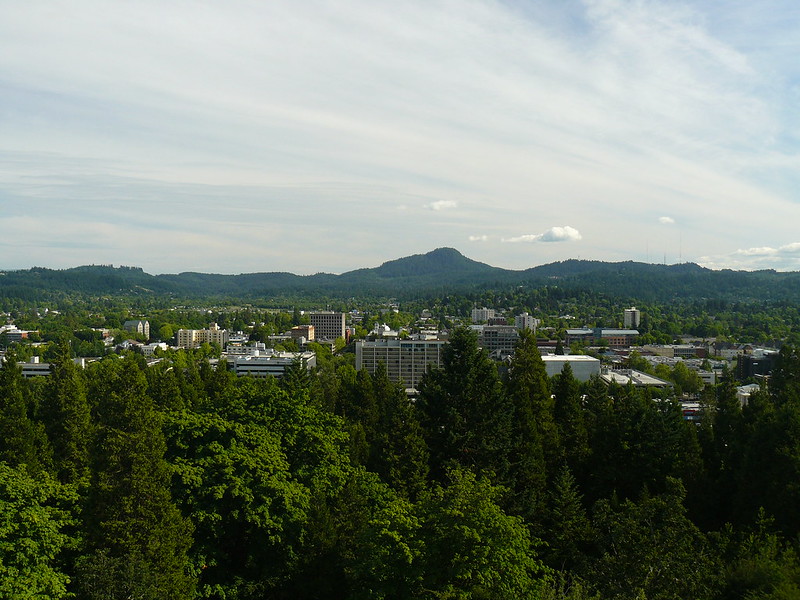Many Northwest communities are trying to free themselves from fossil fuels, but the region’s widespread reliance on natural gas to heat and operate buildings poses a major challenge.
But cities have a hidden mechanism for cleaning up their energy supply: they can modify their contracts that govern how utilities can use the public right of way—their “franchise agreements”—to reduce gas consumption or replace it with cleaner energy. Probably no city has done more on this score than Eugene, Oregon, where policymakers and advocates are weighing innovative changes to the city’s franchise agreements—changes that other cities could replicate to reduce their own greenhouse gas emissions.
Eugene’s City Council has engaged a voluntary advisory body, the Sustainability Commission, to develop various ideas for meeting the City’s climate goals. In a July 2019 presentation, the Commission laid out a series of policy recommendations to be included in the City’s franchise agreement with its gas utility, NW Natural. These proposals represent perhaps the most sophisticated approach any government in North America has yet considered to reducing gas use through franchise agreements, and so they can serve as a template for other cities across North America.
The Commission’s recommendations include the following:
- Gas customers should be incentivized to reduce their use of gas and to purchase greenhouse gas offsets for their carbon emissions.
- NW Natural should be prohibited from offering financial incentives to entice customers to switch to gas from other energy sources. (NW Natural currently offers customers up to $2,550 to switch.)
- The City should limit the construction of new gas infrastructure.
- NW Natural should be required to supply low-carbon gas, such as “renewable gas” captured from landfills and dairy farms.
- Eugene should increase its franchise fees for NW Natural and use the revenue to encourage customers to switch from gas to renewable electricity.
- Eugene should reduce the term of its franchise agreement from 20 years to less than 10 years in order to give policymakers more ability to monitor, enforce, and revise the agreement.
- The City should provide a two-tiered franchise fee structure: a fixed fee plus a variable fee assessed in proportion to the carbon-intensity of gas supplied by the utility.
- Until NW Natural can offer a lower-carbon energy product than fracked or conventional gas, Eugene should disallow the expansion of gas infrastructure or incentives to convert customers to gas.
The proposal leans heavily on requirements for utilities to supply a low-carbon gas, such as methane gas captured from landfills and dairy farms. Some climate activists question whether these should really be promoted as sources of renewable energy, but for the moment both can supply a replacement for fracked gas cost-effectively, according to independent analyses by NW Natural and the State of Oregon.
And the proposal suggests that failing to meet the low-carbon gas requirements would result in penalties in the form of increased franchise fees or limitations on NW Natural adding new customers or offering incentives for customers to switch to gas.
Several of the recommendations are likely to increase customers’ out-of-pocket costs by at least a little, and so Eugene’s City Council must evaluate the potential impact on low-income gas customers. Yet there are ways to ameliorate any costs increases by investing money collected from penalties in things that benefit lower-income households, such as targeted energy bill assistance, subsidized efficiency programs, or switching customers from gas to electric appliances.
The recommendations that Eugene’s leaders are weighing are path-breaking, the first of their kind in the US as far as we know. Whether or not Eugene’s city council moves ahead with new ordinances or new contract language, the conversation happening there should be a source of inspiration—and, perhaps, replication—by other local governments. The real question is who will go next?
Laura Feinstein volunteers with Sightline researching energy policy. She spent 11 years in the utility industry, working in energy conservation and engineering.
Eric de Place is Sightline’s Director of Thin Green Line. He is a leading expert on coal, oil, and gas export plans in the Pacific Northwest, particularly on fossil fuel transport issues, including carbon emissions, local pollution, transportation system impacts, rail policy, and economics.


Comments are closed.